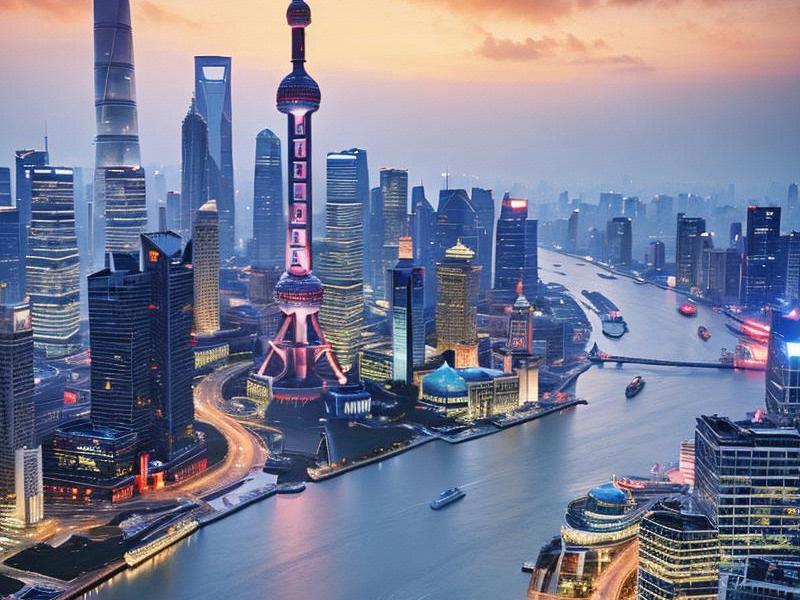This article delves into the remarkable transformation of Shanghai, exploring its cultural renaissance and economic evolution. It examines how the city has managed to blend its rich history with modern innovation, becoming a global hub for culture, finance, and technology.

Shanghai, a city that has long been a symbol of China's economic prowess, is now also making waves in the realm of cultural renaissance. Over the past few decades, this bustling metropolis has undergone a remarkable transformation, blending its rich historical heritage with cutting-edge modernity. Today, Shanghai stands as a beacon of China's cultural and economic evolution, captivating the world with its unique blend of tradition and innovation.
The city's journey towards renaissance began in the late 20th century when it was designated as China's "experimental field" for economic reforms. This bold move by the Chinese government unlocked Shanghai's potential, propelling it to the forefront of China's economic boom. The city's strategic location, coupled with its well-developed infrastructure and business-friendly environment, made it an ideal hub for foreign investment and trade.
As Shanghai's economy flourished, so did its cultural scene. The city's leaders recognized the importance of preserving its historical and cultural heritage while embracing modernity. This led to a series of initiatives aimed at revitalizing Shanghai's cultural identity, including the restoration of historic buildings, the promotion of traditional arts and crafts, and the development of new cultural institutions.
One of the most iconic examples of Shanghai's cultural renaissance is the Bund and Pudong area. Once a symbol of colonialism, the Bund has been transformed into a vibrant waterfront promenade, lined with modern skyscrapers and historic buildings. Pudong, on the other hand, has emerged as a global financial hub, home to some of the world's tallest buildings, including the iconic Oriental Pearl Tower and the Shanghai Tower.
上海龙凤阿拉后花园 The city's cultural transformation is not limited to its architecture and landmarks. Shanghai has also become a hub for the arts, with numerous museums, galleries, and theaters showcasing the works of both local and international artists. The Shanghai Museum, for instance, is renowned for its extensive collection of Chinese art, while the Shanghai Grand Theatre hosts a wide range of performances, from classical music to contemporary dance.
In addition to its cultural attractions, Shanghai is also a major center for education and research. The city is home to several world-class universities, including Fudan University and Tongji University, which attract students and scholars from around the globe. These institutions play a crucial role in fostering innovation and advancing knowledge in various fields, including science, technology, engineering, and medicine.
The economic transformation of Shanghai has been equally remarkable. Once a relatively small fishing village, the city has grown into one of the largest and most dynamic economies in the world. Its GDP has skyrocketed over the past few decades, making it a key player in the global economy.
Shanghai's economic success can be attributed to several factors, including its strategic location, well-developed infrastructure, and business-friendly environment. The city is located at the mouth of the Yangtze River, providing easy access to the vast hinterland of China. Its extensive network of highways, railways, and airports connects it to other major cities in China and around the world.
上海龙凤419会所
The city's business-friendly environment has also played a crucial role in its economic success. Shanghai has implemented a series of reforms aimed at attracting foreign investment and promoting entrepreneurship. These include tax incentives, streamlined administrative procedures, and a strong emphasis on intellectual property protection.
One of the most significant developments in Shanghai's economic transformation is the rise of its financial sector. The city has become a global financial hub, home to the Shanghai Stock Exchange and the Shanghai Futures Exchange. It is also a major center for banking, insurance, and other financial services.
In addition to its financial sector, Shanghai is also a leader in manufacturing and trade. The city is home to several major industrial zones, including the Shanghai Chemical Industry Park and the Zhangjiang High-Tech Park. These zones house a wide range of industries, from pharmaceuticals and biotechnology to information technology and renewable energy.
爱上海419论坛 The economic transformation of Shanghai has also had a profound impact on its society and culture. The city's rapid growth has brought about significant changes in the lives of its residents, from improved living standards to increased access to education and healthcare. At the same time, it has also presented challenges, such as urbanization, environmental concerns, and social inequality.
To address these challenges, the city's leaders have implemented a series of policies aimed at promoting sustainable development and social harmony. These include initiatives to improve urban planning, reduce pollution, and enhance social welfare. The city has also invested heavily in public transportation, developing an extensive network of subways, buses, and ferries to reduce traffic congestion and promote environmental sustainability.
Despite these challenges, Shanghai's cultural and economic transformation has been nothing short of remarkable. The city has managed to preserve its rich historical and cultural heritage while embracing modernity and innovation. It has become a global hub for culture, finance, and technology, captivating the world with its unique blend of tradition and progress.
As Shanghai continues on its journey towards renaissance, it faces both opportunities and challenges. On the one hand, the city has the potential to become a global leader in various fields, from finance and technology to culture and education. On the other hand, it must also address the challenges posed by rapid urbanization, environmental concerns, and social inequality.
In conclusion, Shanghai's cultural and economic transformation is a testament to the city's resilience and adaptability. It has managed to blend its rich history with modern innovation, becoming a global hub for culture, finance, and technology. As the city continues on its journey towards renaissance, it will undoubtedly continue to captivate the world with its unique blend of tradition and progress.